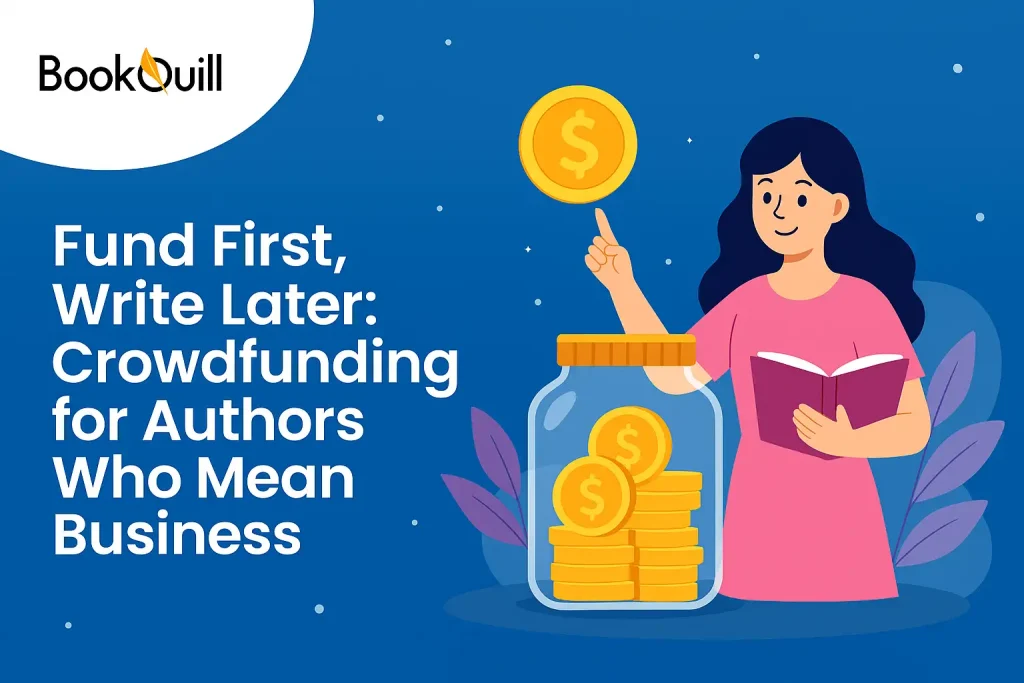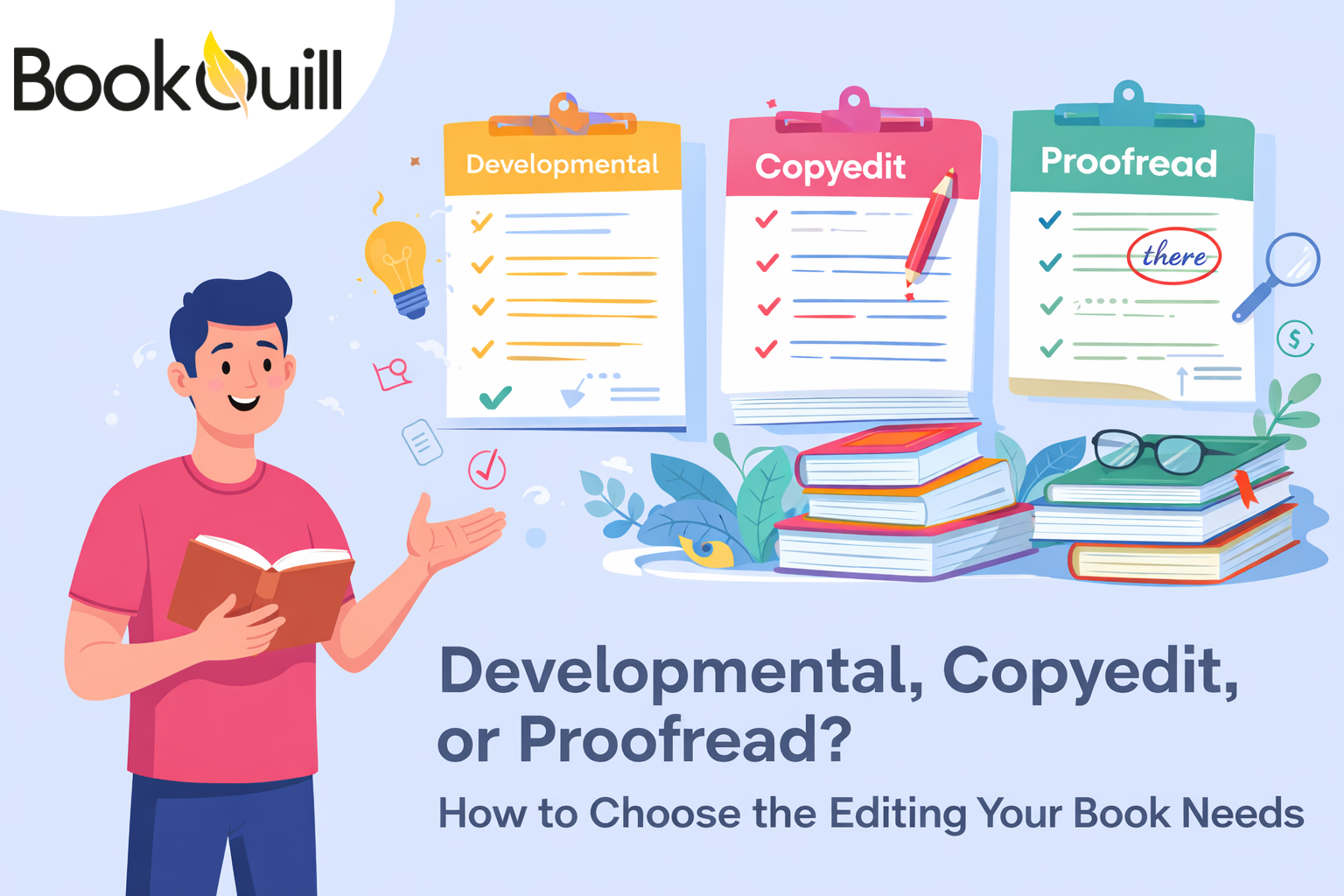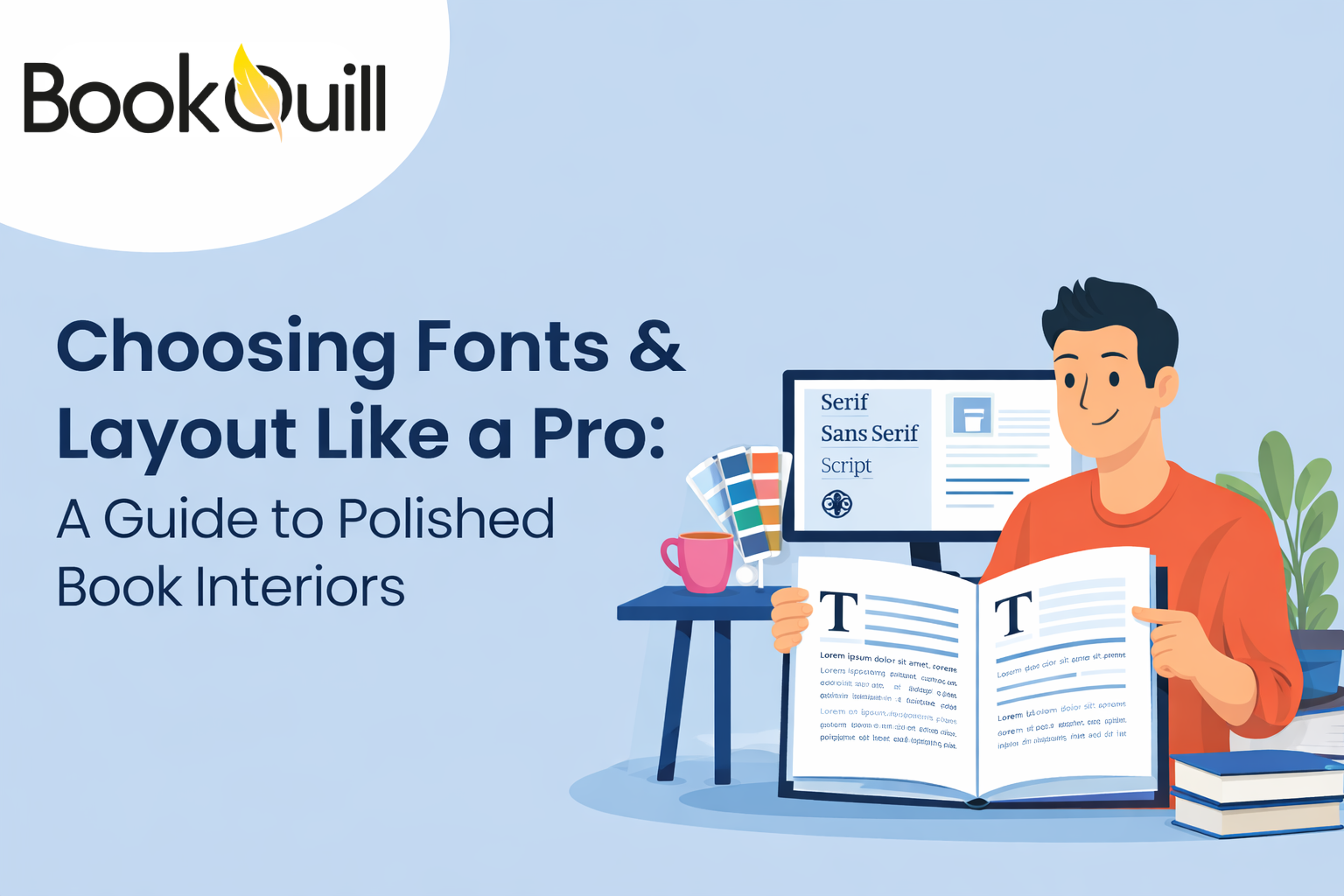Table of Contents
Explore Blogs
Trending on Ebook
Fund First, Write Later Crowdfunding for Authors Who Mean Business

If you are like most writers, your process probably looks like this.
Writing the book, rewriting the book, wrestling with impostor syndrome, editing it again, and then being confused about how you are going to pay for a cover, formatting, and maybe a marketing plan.
But wait, what if we flip the script?
What if you could get paid before you wrote even a single chapter? How about that? Or what if your readers helped fund your publishing journey because they believed in your story before it even hit the page?
Yes! That’s exactly what crowdfunding lets you do. And if you are an author who “means business”, aka, someone who takes their publishing dreams seriously, this method might just change your career.
Well, you can call it the smartest and the savviest way to publish. And now we know you want to know about it in more depth, so let’s talk about why funding first and writing later isn’t just possible, but it’s strategic.
Key Takeaways
- Crowdfunding books lets authors fund editing, design, and marketing before writing, which is a smart strategy for anyone serious about publishing like a pro.
- Authors who treat their writing like a business can use crowdfunding to build an audience, validate their idea, and secure pre-orders.
- A great crowdfunding pitch example includes a good budget, killer rewards, and authentic storytelling.
- Public funding isn’t just funding, it’s launch prep, audience-building, and marketing all combined into one powerful campaign.
- Partnering with a professional can turn your fundraising campaign from stressful to strategic and set your whole author brand up for success.
What Is Crowdfunding Your Book and Why It’s a Smart Strategy
It is when you raise money for your book project by collecting small contributions from a large number of people, usually via platforms like Kickstarter, Indiegogo, or Publishizer.
To put it simply, instead of begging your rich uncle to fund your book, you build an audience of readers who become investors, backers, and built-in super fans.
Most authors think fundraising is just a fallback plan when you are broke. That’s not true. That’s outdated thinking. In reality, crowdfunding books is a forward-thinking strategy used by professionals who want to publish without draining their savings.
Take Brandon Sanderson, for example. In 2022, he ran the most successful publishing Kickstarter in history, raising over $41 million. Granted, he’s got a mega fan base, but the point is, readers are more than willing to pay for books that excite them.
And no, you don’t need millions of fans. Even small campaigns often succeed when authors set reasonable funding goals, offer appealing rewards, and market their pitch well. It’s a great method for figuring out if people care about your idea before you sink thousands of dollars into it.
So if you have ever Googled “how to get funding to write a book”, this is it.
Why “Fund First, Write Later” Isn’t Backwards, It’s Smart
At first, getting funding before writing might sound like doing things out of order. But there’s a reason it works. Here’s the thing! You are not just an author, you are a creator running a business. And in business, you don’t wait until a product is built to find out if anyone wants it. You make sure people want it. Find the funding. Then you build.
Yes, that’s that! Or you can call it “authorpreneurship!”
Crowdfunding gives you something most writers never get at the beginning of their creative journey, and that is momentum. Instead of just writing, you are writing with feedback, funding, and focus like:
- A clear purpose
- Real accountability
- Financial backing
- A built-in group of excited readers cheering you on
Amazing, right? There’s a deep psychological shift that happens when people pay you to create something. You move from “I hope this turns out okay” to “I have a mission to deliver.” That pressure can be a powerful motivator.
It’s also a logistical win. Having funds up front means you can hire:
- A professional editor
- A designer who makes covers that actually sell
- A formatter who ensures your book doesn’t look like it was printed in WordPad
And maybe most importantly, you can invest in real marketing. Be it Facebook ads, blog tours, influencer outreach, or working with the best book marketing services, you’ll have countless options.
What Kind of Authors Should (and Shouldn’t) Crowdfund
So, can every author do crowdfunding? Well, honestly, it is not for everyone. Don’t consider it as an ATM where you click “launch campaign” and the money rains down. Nope, that’s not it. But for the right kind of author, it can change everything.
Authors Who Should Crowdfund
1. Writers with a Strong Concept or Unique Hook
If your book has a compelling premise, you’re already ahead. Crowdfunding rewards originality, not because it’s trendy, but because backers are investing in something fresh.
2. Authors Who Already Have Some Kind of Audience
This doesn’t mean you need 10k Instagram followers or a viral blog. Even a small but loyal email list, a niche podcast audience, or an engaged Facebook group can make all the difference. It’s less about size, but more about conversion.
3. Writers Who Treat Their Book Like a Project, Not a Passion
You need to manage timelines, vendors, backers, and deliverables. If you’re organized or can at least pretend convincingly, you’ll do well.
4. Authors Who Want To Level Up Their Brand
Crowdfunding can enhance your visibility, build credibility, and position you as an author who takes things seriously. Not to mention, the experience teaches you invaluable skills in pitching, budgeting, and marketing, the same skills used by every successful authorpreneur.
Authors Who Shouldn’t Crowdfund (yet)
1. Writers Who Don’t Want To Market Themselves
If the idea of telling anyone about your book makes your skin crawl, crowdfunding will be tough. A campaign is a public declaration of “I’m doing this!” and it grows with visibility. You don’t need to be a marketing expert, but you do need to be willing to show up.
2. Authors Who Don’t Understand (Or Want to Learn) Fulfillment
Books don’t ship themselves. If you’re not ready to think through packaging, delivery timelines, international shipping, or digital downloads, either find a partner or wait until you’re ready.
3. Writers Who Want To Finish the Book in Total Secrecy
If your creative process requires total privacy and no feedback until the book is done, crowdfunding may feel intrusive. Backers expect updates. You’re inviting people in.
Crowdfunding is a bold step. But it’s also a smart and scalable one, if you’re the kind of author who’s ready to treat writing like a business.
What to Include in a Killer Crowdfunding Campaign
Crowdfunding success is less about the idea and more about the presentation. Your campaign has to inspire trust and excitement, and that little internal “HECK YES” button that makes someone click back on this project. Here’s how you do it.
1. The Pitch Video: Short, Authentic, and Passionate
The video is the most important part of your campaign. It is what makes your campaign feel real to people. Its length should be about 1 to 3 minutes max. The focus should be on who you are, what the book is about, why it matters, and how people can help. Also, don’t forget to smile, breathe, and be human. It works!
2. The Campaign Copy: Tell a Story
People back people, not just products. So yes, include the logistics, but make it emotionally engaging.
- What inspired the book?
- Who’s it for?
- What do you need the money for?
- Why now?
Also, use formatting wisely. Subheadings, bold text, and short paragraphs. And do not make it too lengthy. People don’t read big chunks of text, even if it’s great.
3. Timeline and Production Plan
Reassure your backers you’ve thought things through. When will you finish the draft? When will editing happen? When should they expect delivery?
4. Budget Breakdown
People trust you more when they know where the money’s going. Common items include:
- Developmental and copy editing
- Cover design and interior formatting
- Proofreading
- ISBNs and barcodes
- Marketing and promo (maybe through a professional book marketing service)
- Printing and shipping
5. Reward Tiers
This is where crowdfunding becomes fun. The best campaigns offer creative, tiered rewards that make backers feel special and give them something tangible to look forward to. Ideas include:
- Digital copy of the book
- Signed paperback or hardcover
- Bookmarks, stickers, character art
- “Behind the scenes” PDF or video series
- Name a character in the book
- Book club access or launch party invites
- Exclusive items like tote bags or enamel pins
Want more funding? Make the rewards irresistible.
6. Stretch Goals & Bonuses
Already hit your target? Offer stretch perks to keep the momentum going:
- Bonus chapter or short story
- Audiobook version unlocked
- Upgraded cover or interior illustrations
- Exclusive backer-only Zoom event
If you need a crowdfunding pitch example, just look at how Brandon Sanderson’s strong personal video, crystal-clear budget, and cool rewards.
Which Crowdfunding Platforms are Best for Authors and Why
Not all platforms are created equal, and choosing the wrong one could flop your campaign before it even starts. Each site comes with its own vibe, rules, and audience expectations. Here’s the brief description of the big four and how to pick the right one for your book.
1. Kickstarter
If you have heard of crowdfunding, you might have also heard about Kickstarter, and for good reason. It’s the most popular platform for authors and is where readers actively browse for creative projects to back.
Pros:
- Great built-in audience for books and comics
- Massive exposure if your campaign gains traction
- All-or-nothing model builds urgency
Cons:
- You only get the money if you hit your goal
- High competition, presentation matters
- Rigid campaign durations (max 60 days)
It is best for authors with a clear timeline and strong pre-launch buzz who want to build hype fast.
2. Indiegogo
Indiegogo offers more relaxed rules than Kickstarter and lets you choose between all-or-nothing or keep-what-you-raise funding.
Pros:
- Flexible funding option available
- Longer campaign duration
- Better for ongoing funding needs
Cons:
- Smaller book-browsing audience
- Less urgency than Kickstarter
- Discovery tools aren’t as strong
It is best for authors who prefer a slower campaign rollout or need extra flexibility.
3. Publishizer
Not quite famous, but it is the best alternative for authors that offers real value. It lets you run a preorder campaign and then pitches your book to traditional publishers.
Pros:
- Specific to book campaigns
- Connects authors to publishers and hybrid presses
- Focused on preorders, not perks
Cons:
- Limited customization
- Smaller user base
- Requires a polished proposal to succeed
It is best for authors hoping to land a publishing deal after building preorder traction.
4. Patreon
While not traditional crowdfunding, Patreon lets you earn ongoing monthly support from fans. Perfect for serial fiction authors or creators who are growing a brand with patience and intention.
Pros:
- Recurring income
- Strong community-building features
- No campaign deadlines
Cons:
- Takes time to grow
- Requires constant content creation
- Less suited for single-book projects
So… Which One Should You Use?
If you’re launching a single book with a specific timeline, Kickstarter is still the top choice for most authorpreneurs. But if your strategy is long-term and community-based, Patreon could be the perfect fit for you. Indiegogo and Publishizer are fantastic alternatives, too, but it all depends on how flexible or publishing-focused you want to be.
And no matter the platform, remember that presentation is everything. A weak pitch will flop even on the best site. If you’re unsure how to create a killer campaign page, this is where working with a professional book marketing service becomes a smart investment.
Common Mistakes Authors Make in Crowdfunding and How to Avoid Them
Crowdfunding can be powerful, but it’s also brutally honest. It will expose any cracks in your planning, your pitch, or your platform. And too many authors walk in blind and wonder why their campaign flops.
Let’s make sure that’s not you. Here are the most common blunders and how to dodge them like a pro:
Mistake #1: Setting the Goal Too High or Too Low
Set your funding target too high, and you risk intimidating backers (“Wait… they need $15,000?”). Set it too low, and you risk not covering your real costs or looking unprofessional. So, it’s better to do your homework beforehand.
Mistake #2: Overpromising and Underdelivering
We get it. You’re excited. You want to offer a signed hardcover, custom art, and personalized mugs for every donor. But if you don’t plan for time and cost, you’ll fall behind fast. So, to fix it, try to keep rewards manageable, scalable, and priced properly.
Mistake #3: Not Accounting for Shipping and Fulfillment
Shipping can ruin a campaign if you don’t plan for it. Especially international shipping, when rates spike or your book ends up heavier than you thought. But don’t worry, you can fix it through tools like BackerKit to estimate fulfillment costs.
Mistake #4: Going in Cold
If you launch with no warm-up, no audience, and no teaser campaign, don’t be surprised when your campaign stalls at $37 and your only backer is your aunt. How to fix that? Trying to create the buzz before the launch.
Mistake #5: Ignoring Taxes, Fees, and Platform Cuts
Yes, Kickstarter will take a slice. So will your payment processor. And in most countries, crowdfunding income is taxable. If you raise $10,000, you’re not pocketing $10,000. The best way to fix this is by tracking your expenses, talking to a tax professional, and setting your goals with those fees in mind.
To Wrap Up
If you are planning your first campaign or trying to recover from a launch that flopped, you don’t have to figure it all out alone.
At BookQuill, we specialize in professional yet affordable book marketing services for authors like you, who want to reach more readers, make real money, and build a brand that lasts.
From campaign planning to launch strategy, ad setup, email marketing, fulfillment systems, and everything in between, we’re the best book marketing company with the right tools and team to help you achieve your goals.
Let’s build your dream book, funded and future-proof.
Reach out to us and start writing like you’re already funded.
Frequently Asked Questions
What is Crowdfunding for Authors, and How Does It Work?
It is a method that allows authors to raise money before their book is complete by pitching the idea to readers online. It’s a powerful way to test your concept, build buzz, and secure book marketing funds early.
Can I Really Get Funding to Write a Book Before It’s Finished?
Yes! Many successful authors use platforms like Kickstarter to raise money for editing, cover design, and more, even before writing is done.
What Should I Include in My Crowdfunding Pitch to Attract Backers?
A great crowdfunding pitch example includes a compelling video, budget breakdown, clear rewards, and a personal story that connects with readers.
Which Platform Is Best for Authors?
Kickstarter is the most popular for crowdfunding books, but Indiegogo, Publishizer, and even Patreon offer great alternatives depending on your goals and audience.
How Can a Book Marketing Company Help with Crowdfunding?
The best book marketing company can help you plan your campaign, create your pitch, and reach the right audience, increasing your chances of success.
About Author
Hi, my name is Zachary Stone I’m a book marketing nut — or, as I like to call myself, a “Shelf Marketer.” No, I don’t sell wooden shelves; I market the books that are left forgotten on them. If you want your book to be the next bestseller, I am your go-to person. I am here to remind you that it’s not just about writing a great story — it’s about building a buzz among people with great campaigns.




